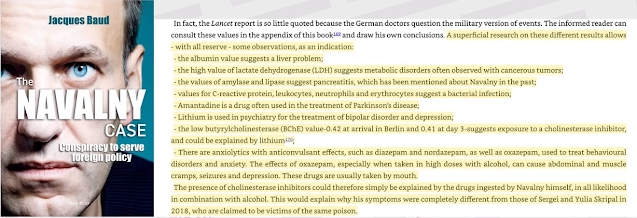Enter Navalny, conveniently dead.
The headlines above are from my local daily newspaper this morning, the Democratic Party-aligned Portland Press Herald. As genocide and humanitarian disaster unfold in Gaza, these were their featured news items: "Kremlin critic" threatened with a criminal's burial whose death provides an excellent pretext for 500+ new sanctions against Russia.
Because the sanctions imposed on Russia so far have been so effective -- not. Unsanctioned Germany's economy is in the toilet but Russia's economy has thrived. Will the fading empire wake up and realize that its sanctions are counter productive and, at this point, embarrassingly so? Believing in 2022 that sanctions would weaken Russia is understandable. Clinging to this now smacks of wishful thinking with only a tenuous grasp on reality.
Widow Yulia Navalny getting a hug from President Biden in a photo released by the White House this week.So who was Navalny anyway? Unless you've been paying a ton of attention over the past several years, he's probably not who you think he is.
A succinct examination of Alexi Navalny's life and death can be found on the Redacted channel by Natali Morris, a former anchor and reporter for MSNBC, CNBC, and CBS News. Morris addresses four key questions:
1) Was he really a hero worth championing?
2) Was he poisoned, specifically by the Russian government?
3) Was he wrongfully imprisoned?
4) Was he actually Putin's main opponent?
Short answers: no, maybe but not likely, no, and no.
Morris references her main source as Jacques Baud's book The Navalny Case: conspiracy to serve foreign policy. (You may remember Baud as the Swiss diplomat who offered useful background and context for the Ukraine proxy war that was widely shared in 2022.)
Long answers:
1) Not a hero.
A Salon article from 2017 called Navalny "the Russian Donald Trump" for his white supremacist and anti-immigrant views, and affiliation with skinhead groups in Moscow. He's especially notorious for a 2007 "Muslim migrants are cockroaches" video that's hard to find these days.
2) Stories abound about what Navalny was poisoned with, when -- like, back in 2020 -- and how. Water bottles? Underwear? Many have posed the cui bono (who benefits?) question pointing out that it makes Putin's regime look bad to have an opponent die in prison. Morris has also published a new video investigating the likelihood that British operatives poisoned Navalny. Following his death, the U.S. quickly slapped 500+ new sanctions on Russia because: Navalny. So you be the judge of who benefited.
Novitchok, the poison believed to have been used, is a NATO favorite and so lethal than anyone near a person poisoned -- or deploying the poison -- must wear full protective gear. None is in evidence in photos of Navalny traveling to Germany to be treated.
Why did Russia allow Navalny to depart on a flight to Berlin if they were the poisoners?
Here's the UK medical journal The Lancet on Navalny's blood work back in 2020:
3) Navalny was indicted on corruption charges and given a parole (lenient) sentence. He had violated parole multiple times prior to the alleged poisoning, and eventually had his suspended sentence revoked.
4) Putin's main opposition is the Communist Party, not right wing extremists who follow Navalny. "When Russians see the Western press champion someone, they get suspicious that that person is a Western puppet. And there is a lot of evidence that Alexei Navalny was indeed a Western puppet, and supported by American government NGOs and the CIA."
Morris promises to take up that claim and its evidence in a subsequent video, but in the meantime there are plenty of examinations of this particular point from the last few years.
Most intriguing is this piece by Tony Cartalucci published almost four years ago in the blog Land Destroyer: "Navalny Poisoning -- The Real Target is Russian-German Nord Stream 2 Pipeline."
Hmmm...the plot thickens.







No comments:
Post a Comment